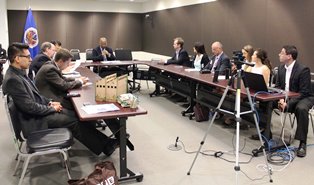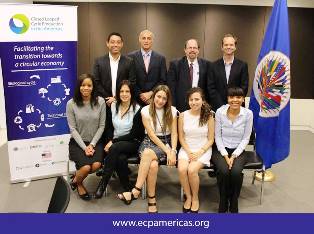
 The working meeting was part of an ECPA initiative called “Closed Looped Cycle Production in the Americas,” which promotes a new approach to production in which materials that have reached the end of their useful life can be recycled, repurposed, or returned to the earth as nutrients. Closed-loop production is based on the “cradle-to-cradle” (C2C) philosophy, which rethinks the way products are designed, manufactured, and delivered so as to reach maximum sustainability.
The working meeting was part of an ECPA initiative called “Closed Looped Cycle Production in the Americas,” which promotes a new approach to production in which materials that have reached the end of their useful life can be recycled, repurposed, or returned to the earth as nutrients. Closed-loop production is based on the “cradle-to-cradle” (C2C) philosophy, which rethinks the way products are designed, manufactured, and delivered so as to reach maximum sustainability.
The OAS Department of Sustainable Development manages the program, which is implemented in conjunction with several public and private partners. Members of this consortium—which includes the Cleaner Production Center of Colombia, McDonough Braungart Design Chemistry, the Cradle-to-Cradle Expo Lab, and the U.S. Environmental Protection Agency—attended the recent working meeting, along with representatives of Colombia, Panama, and Trinidad and Tobago. The three countries are participating in the initiative’s 2013-2015 phase, which comes on the heels of a successful pilot program in Ecuador.
During the meeting, the representatives of these countries had a chance to give an overview of their industrial sectors and talk about their interest in incorporating and implementing a sustainable approach to production. Under the action plans approved at the meeting, a project in Colombia will focus on Sustainable Productive Development for a Circular Economy. In Panama, the ECPA program will work with local players to help develop the “Green Panama” seal of approval. A project in Trinidad and Tobago, meanwhile, will focus on analyzing a sustainable material to replace the polystyrene foam containers commonly used for food.
 Participants in the two-day meeting included the points of contact from Colombia’s Ministry of Trade, Industry, and Tourism, Edith Urrego and Fernando Montaño; the representative from Panama’s Ministry of Trade and Industry, Ahmed E. Morón, and the president of the Industrial Syndicate of Panama, Aida Michelle de Maduro; and Rikhi Permanand, representing Trinidad and Tobago’s Ministry of Planning and Sustainable Development. The Director of the OAS Department of Sustainable Development, Cletus Springer, also participated in the meeting.
Participants in the two-day meeting included the points of contact from Colombia’s Ministry of Trade, Industry, and Tourism, Edith Urrego and Fernando Montaño; the representative from Panama’s Ministry of Trade and Industry, Ahmed E. Morón, and the president of the Industrial Syndicate of Panama, Aida Michelle de Maduro; and Rikhi Permanand, representing Trinidad and Tobago’s Ministry of Planning and Sustainable Development. The Director of the OAS Department of Sustainable Development, Cletus Springer, also participated in the meeting.
During the first phase of this initiative, implemented in Ecuador from 2010 to 2013, the OAS and its consortium partners worked with the country’s Coordinating Ministry of Production, Employment, and Competitiveness to create a national program to encourage closed-loop manufacturing practices. As a result of that process, an Ecuadorian company that produces energy bars (Batery Alimentos) became the first company in the region to become C2C-certified.
 View Map
View Map